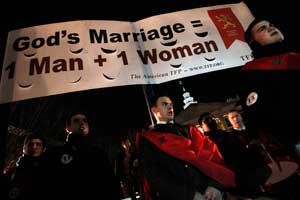INDIANAPOLIS –– In a decision that could strain relations with the Catholic Church and within its own Anglican Communion, the Episcopal Church has approved liturgical resources for the blessing of same-sex relationships.
 Deputies to the Episcopal General Convention watch a screen as the Very Rev. David Thurlow of South Carolina addresses the convention in Indianapolis July 10. The convention approved a rite of blessing for same-sex unions, making the Episcopal Church th e largest U.S. denomination to do so. Rev. Thurlow spoke against adoption of the blessing, saying it was a departure from the church’s teaching on marriage. (CNS photo/Mary Frances Schjonberg, courtesy of Episcopal News Service)The church’s House of Bishops voted 111-41 July 9 in favor of provisional use of the resources until the next General Convention, held every three years. About 80 percent of the church’s House of Deputies gave their approval July 10.
Deputies to the Episcopal General Convention watch a screen as the Very Rev. David Thurlow of South Carolina addresses the convention in Indianapolis July 10. The convention approved a rite of blessing for same-sex unions, making the Episcopal Church th e largest U.S. denomination to do so. Rev. Thurlow spoke against adoption of the blessing, saying it was a departure from the church’s teaching on marriage. (CNS photo/Mary Frances Schjonberg, courtesy of Episcopal News Service)The church’s House of Bishops voted 111-41 July 9 in favor of provisional use of the resources until the next General Convention, held every three years. About 80 percent of the church’s House of Deputies gave their approval July 10.
The secretary of the Pontifical Council for Promoting Christian Unity called the decision “a huge obstacle on the path to Christian unity,” saying it would affect the Catholic-Episcopal dialogue in the United States.
Bishop Brian Farrell told Catholic News Service in an email July 12 that the decision jeopardizes the achievements of the Anglican-Roman Catholic International Commission since 1970.
After a six-year hiatus, the official Anglican-Roman Catholic dialogue began a new phase in May – known as ARCIC III – to discuss the relationship between the local and universal church, as well as women’s ordination, same-sex unions and actively homosexual clergy.
Bishop Farrell acknowledged that Anglican Archbishop Rowan Williams of Canterbury had already called for any province of the Anglican Communion that could not abide by the moratorium on the ordination of people living in same-sex unions to withdraw from the dialogue commission, which the Episcopal Church did.
“Beyond this technical consideration, ARCIC III will continue, but it will have to seriously face the enormous challenge being posed by the internal situation of the Anglican Communion,” Bishop Farrell said.
The Episcopal Church is a member of the Anglican Communion, which has opposed the blessing of same-sex unions and the ordination of openly gay bishops.
At the convention in Indianapolis, Bishop Edward Little of Northern Indiana said during the debate on liturgical resources for same-sex blessings that their approval would “put the Episcopal Church out of the Christian mainstream.”
“The Christian world is going to understand us as having changed the nature of the sacrament of holy matrimony,” he said. “The Christian world will … see vows, and exchange of rings, a pronouncement and a blessing and they will understand that to mean the Episcopal Church has endorsed same-sex marriage and changed a basic Christian doctrine. I do not believe that we are free to do that.”
Episcopal Bishop Mark J. Lawrence of South Carolina and five of the seven deputies from the diocese protested the move by not being on the floor during the vote. Two deputies remained to monitor events, the Diocese of South Carolina said in a statement.
“The South Carolina Deputation has concluded that we cannot continue with business as usual,” the statement said. “We all agree that we cannot and will not remain on the floor of the House and act as if all is normal.”
During a private session of the House of Bishops July 11, Bishop Lawrence called the resolutions “disconcerting changes to the doctrine, discipline and worship of the Episcopal Church – to which every bishop, priest and deacon is asked to conform.”
“More importantly they mark a departure from the doctrine, discipline and worship of Christ as this church has received them, therein making it necessary for me to strongly differentiate myself from such actions,” he added.
Both houses of the General Convention also voted to approve a resolution titled “Extending the rights of the laity” that forbids discrimination against members of the transgendered community.
The resolution added gender expression and identity to the categories in which discrimination is banned. Church policy will now make clear that the ordination discernment process is open to transgendered people and that they have an equal place in the life, worship and governance of the church.
Oblate Fr. John W. Crossin, executive director of the U.S. bishops’ Secretariat for Ecumenical and Interreligious Affairs, declined an interview request about the move, saying, “We don’t comment on the internal workings of other churches.”
Meanwhile in Pittsburgh, the General Assembly of the Presbyterian Church (USA) voted July 7 to neither reaffirm nor reject the denomination’s definition of marriage as “a civil contract between a man and a woman.”
Accepting a suggestion of its Assembly Committee on Civil Union and Marriage Issues, the body called for two years of “serious study and discernment” about Christian marriage.
By a vote of 338-308, the assembly rejected the committee’s recommendation that the Book of Order’s definition of marriage be changed from a man and a woman to two people.
Contributing to this story were Francis X. Rocca in Rome and Nancy Frazier O’Brien in Washington.
